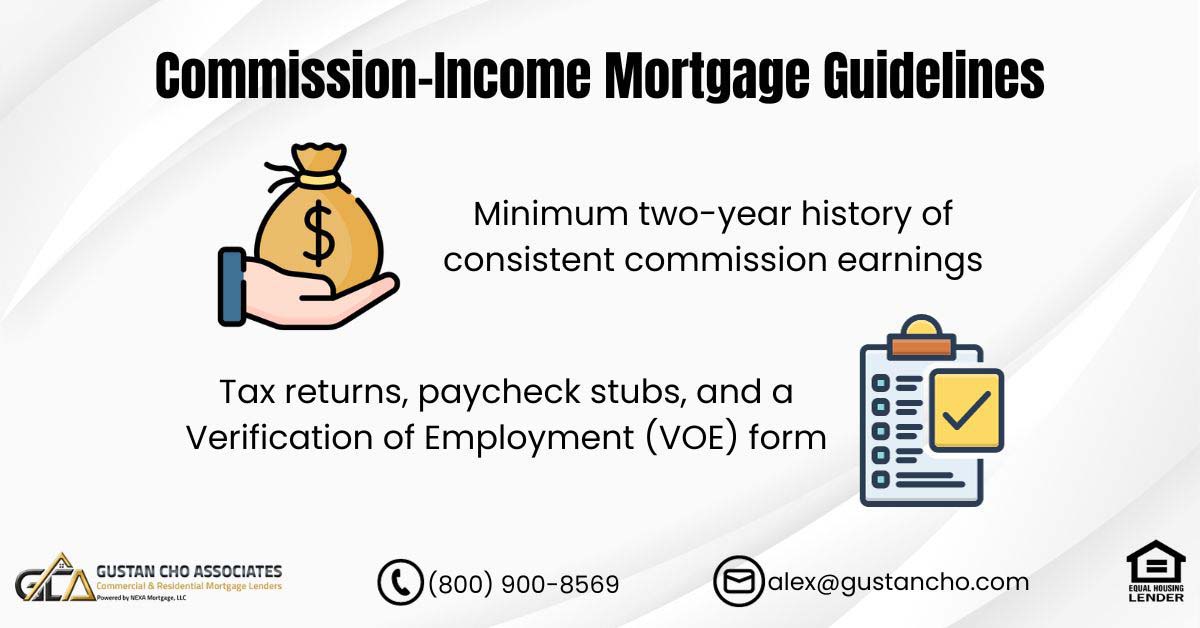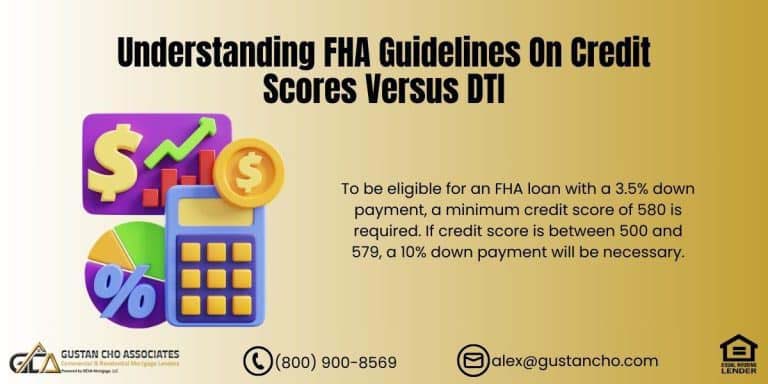This guide covers commission-income mortgage guidelines. We will discuss qualifying for a mortgage when you are on commission income. There are commission-income mortgage guidelines on government and conventional loans when applying for a mortgage. Self-employment or commission-income mortgage guidelines apply to anyone who earns at least 25% of their compensation from self-employment or 1099 income:
According to the guidelines for commission-based income in mortgages, you need a minimum of two years of commission earnings to qualify for a mortgage using this income. However, there are exceptions to this rule. Lenders typically average commission income due to its variable nature, as outlined in the commission-based income mortgage guidelines.
When underwriting, lenders must adhere to the Ability to Repay (ATR) rule on Qualified Mortgages. That means they must ensure borrowers can afford the loan before they approve it. In the following paragraphs, we will cover commission-income mortgage guidelines.
Prequalify for a home loan with commission income in minutes.
Understanding the Debt-to-Income (DTI) Ratio
Lenders consider the Debt-to-Income (DTI) ratio an essential measure, regardless of where your income originates. This ratio gauges the percentage of your monthly income allocated to paying off debts. For individuals earning through commissions, mortgage lenders typically favor a DTI ratio of 43% or lower. A reduced DTI signifies a healthy equilibrium between your income and debts, suggesting that taking on more debt, like a mortgage, is manageable. Grasping and controlling your DTI ratio significantly impacts your ability to obtain favorable loan conditions and maintain financial stability.
Commission-Income Mortgage Guidelines on Time on The Job
It can be challenging to forecast for individuals who are self-employed or have substantial bonus or commission earnings. As a result, the majority of lenders require a minimum of two years’ worth of commission income before considering it in a mortgage application.
If the most recent commission figures don’t accurately reflect your future income potential, it’s up to you and your loan officer to make your case.
If you’ve had a fluctuating income over the past decade, a current dip might not worry lenders as much. Providing extra tax returns or a letter from your employer could offer the reassurance a lender needs. In specific instances, meeting mortgage guidelines might be possible with 12-24 months of commission-based income. If you previously held a salaried role identical to your current commissioned position and your earnings match or exceed the previous income, you may have a strong argument for considering your commission income after just a year.
Commission-Income Mortgage Guidelines on Documentation
As per the guidelines for commission-based income mortgages, lenders typically necessitate two years’ worth of commission earnings when seeking a mortgage based on such income. This requirement applies regardless of whether you’re classified as a 1099 or W2 commission-based earner. Specifically, two years of consistent commission-based employment is necessary. If you’re a W2 earner, you’ll need to furnish 30 days’ worth of paycheck stubs along with two years of W2 forms to validate your income. Notably, W2 earners aren’t asked to provide income tax returns.
If the borrower’s commission income fluctuates monthly, it’s strongly advised to conduct a verification of employment before granting pre-approval. The lender may ask for a Verification of Employment (VOE) form from your employer to detail your commission and other income, verifying the stability of your employment.
Before finalizing your loan, your lender will likely reach out to your employer for a verbal confirmation of your employment. Additionally, they will likely request your tax returns. This step is necessary as many individuals in commissioned sales deduct unreimbursed business expenses. These deductions impact your qualifying income when applying for a mortgage. To verify consistency, your lender might obtain an income tax transcript from the IRS to compare the income on your tax returns with what you reported to them. See today’s mortgage rates.
Commission-Income Mortgage Guidelines on Income Calculation
Commission earnings often fluctuate every month, leading mortgage lenders to typically calculate an average over the last 24 months to ascertain a monthly figure. For those receiving monthly commissions, lenders sum up the earnings from the past 24 months and divide the total by 24 to establish a monthly average.
Calculate your quarterly earnings by dividing the sum of your most recent eight quarterly payments by 24. For those receiving commissions annually, determine your monthly income by dividing the total of the last two payments by 24. Remember, the consistency of your income is a crucial factor to consider.
Your lender typically considers a two-year average for your commission income if it’s stable or on the rise. Yet, if your income showed a decline and settled at a lower figure, the lender would likely base calculations on that reduced monthly commission income. Should your commission earnings demonstrate a downward trend coupled with instability, the lender will conduct a more thorough investigation. Underwriters might acknowledge your most recent, reduced income, or potentially even less than that. Alternatively, the lender could opt to deny your loan application altogether.
HUD Commission-Income Mortgage Guidelines on FHA Loans
HUD, which oversees FHA, permits commission income to qualify for a mortgage if you’ve received it consistently for a minimum of one year. Your current occupation should align closely with the previous one, and there should be a reasonable expectation that this income source will persist.
The Federal Housing Administration calculates commission income by using the lesser of the average commission income earned over the previous two years for commission income earned for two years. Or more or the average income over the time commission income has been earned if less than two years; or the average commission income earned over the previous year.
In addition to our previous blog post that comprehensively covered commission-income mortgage guidelines, other crucial factors warrant attention. Becoming acquainted with these supplementary elements can notably enhance your readiness to effectively navigate the mortgage approval process. This is particularly vital if you depend on commission income as your main source of earnings. Being well-informed about these important considerations empowers you to confidently pursue the steps needed to secure a mortgage aligned with your distinct financial situation.
Prequalify for HUD Commission-income mortgage on FHA Loans
Importance of Credit Score For Self-Employed and Commission-Income Borrowers
Keeping a positive credit score greatly affects the probability of getting approved for a mortgage. Your credit score serves as an evaluation of how trustworthy you are with credit, primarily derived from your credit history. A higher score signifies lower risk for the lender, thus enhancing the likelihood of loan approval. It’s important to note that your credit score can also influence the interest rate provided for the loan. Consequently, maintaining a solid credit score is vital for increasing the odds of mortgage approval and securing a favorable interest rate.
Dealing with Income Stability For Commission-Income Wage Earners
When obtaining a mortgage, it’s crucial to evaluate the stability of your income. This involves examining whether your income remains steady or fluctuates significantly. For individuals earning through commissions, lenders might ask for extra paperwork to confirm financial stability. This may entail showing substantial savings, an emergency fund, or additional assets capable of covering mortgage payments during periods of lower commission earnings. These supplementary precautions assure lenders and showcase your adeptness in managing finances. Consequently, fortifying your income stability can heighten the likelihood of securing mortgage approval.
Risk Assessment of Commission-Income Borrowers
When applying for a mortgage, understanding how lenders assess various income sources is crucial. Commission-based earnings are often seen as less stable compared to consistent salaries, leading lenders to approach them cautiously. This cautious approach might result in additional scrutiny during the loan approval process for those earning commissions. Being aware of this viewpoint is key to preparing for potential extra requirements or scrutiny in your mortgage application. Recognizing this hurdle empowers commission earners to proactively bolster their application, improving their likelihood of approval.
Commission-Income Mortgage Guidelines For Different Loan Types and Their Requirements
Various loan options exist for those seeking financial assistance, each with unique requirements. These requirements can vary even more regarding borrowers with commission income. Different loan types, such as VA, USDA, or conventional loans, may have specific criteria regarding commission income. Michael Neill, the President of AXEN Mortgage (a dba of NEXA Mortgage, LLC), shares the following:
By considering these considerations and the guidelines presented in our original post, you can confidently move forward in your pursuit of securing a mortgage with commission-income. As always, we are here to assist you and answer any questions.
For instance, certain individuals might need a more extensive track record of steady commission earnings or employ an alternative approach to compute their average income. Although commission-based income can complicate the mortgage approval process, grasping these additional considerations can assist you in maneuvering through the system more effectively. It’s crucial to bear in mind that different lenders might have varying criteria regarding commission-based income. Consulting multiple lenders could be advantageous in gaining a clearer understanding of their specific requirements.
Getting Qualified and Pre-Approved For a Mortgage With Commission-Income
Self-employed or commission-income wage earners who need to get pre-approved for a mortgage can contact John Parker, NMLS 124935, of Gustan Cho Associates. If you’ve earned commission income for two years or more, but your most recent income is lower, the underwriter will use the average monthly commission income for that year.
Gustan Cho Associates is licensed in 48 states, including Washington, DC, Puerto Rico, and the U.S. Virgin Islands. We have a national reputation of being able to originate and close loans other lenders cannot do. Armed with a network of 210 wholesale mortgage lenders, the John Parker Team at Gustan Cho Associates are experts in originating government and conventional loans with no overlays, non-QM loans, and commercial loans.
Qualifying for a mortgage with commission income can be complicated. Contact Gustan Cho Associates at (800) 900-8569 or text us for a faster response if you have further questions. Or email us at alex@gustancho.com. The John Parker Team at Gustan Cho Associates is available seven days a week, evenings, weekends, and holidays.
Get a custom mortgage rate quote in minutes.
Commission-Income Mortgage Guidelines FAQ
- What are commission-income mortgage guidelines? Commission-income mortgage guidelines outline the criteria for individuals who earn a significant portion of their income through commissions to qualify for a mortgage. These guidelines apply to both government and conventional loans.
- How many years of commission earnings do I need to qualify for a mortgage? Typically, you need at least two years of commission earnings to qualify for a mortgage based on commission income. However, there may be exceptions to this rule depending on your specific circumstances.
- How do lenders assess commission income when underwriting a mortgage? Lenders usually average commission income over a period of time due to its variable nature. They aim to ensure that borrowers can afford the mortgage payments by adhering to the Ability to Repay (ATR) rule.
- What is the Debt-to-Income (DTI) ratio, and why is it important? The Debt-to-Income (DTI) ratio measures the percentage of your monthly income allocated to paying off debts. Lenders typically favor a DTI ratio of 43% or lower, as it indicates a healthy balance between income and debts.
- How does time on the job affect commission-income mortgage approval? Most lenders require a minimum of two years of commission income before considering it in a mortgage application. However, exceptions may be made, especially if your income history demonstrates stability or growth.
- What documentation is required for commission-income mortgage approval? Lenders typically require two years’ worth of commission earnings, along with additional documentation such as paycheck stubs, W2 forms, tax returns, and a Verification of Employment (VOE) form from your employer.
- How is commission income calculated for mortgage purposes? Commission income is often averaged over the past 24 months to determine a monthly figure. The consistency of your income is a critical factor in this calculation.
- What are the HUD commission-income mortgage guidelines for FHA loans? HUD permits commission income to qualify for an FHA mortgage if it has been received consistently for at least one year. There should be a reasonable expectation of continued income from the same occupation.
- How does credit score impact commission-income borrowers’ mortgage approval? Maintaining a positive credit score is crucial for commission-income borrowers, as it influences the likelihood of loan approval and the interest rate offered.
- What steps can commission-income borrowers take to enhance their mortgage approval chances? Commission-income borrowers should focus on demonstrating income stability, managing their DTI ratio, and understanding the additional scrutiny their income source might face during the loan approval process.
- Can I get pre-approved for a mortgage with commission income? Yes, self-employed or commission-income earners can get pre-approved for a mortgage by contacting lenders who specialize in such cases, like Gustan Cho Associates. They may consider averaging your commission income over a specific period to determine your eligibility.
This blog about Commission-Income Mortgage Guidelines was updated on January 29th, 2024.










